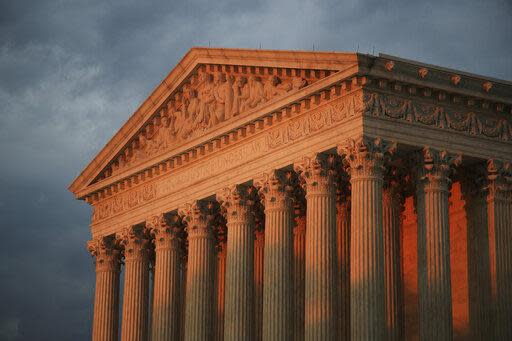Groups seek to send Kansas congressional redistricting case to U.S. Supreme Court

A coalition of groups that challenged the constitutionality of the state's Congressional map have appealed to the U.S. Supreme Court, seeking to overturn a Kansas Supreme Court ruling upholding the district lines.
The appeal, filed Tuesday by the Campaign Legal Center and a host of other groups, including the American Civil Liberties Union and powerhouse firm Elias Law Group, comes five months after the Kansas high court ruling.
Its odds of success are uncertain. The court is historically choosy about which cases it hears, and it is also set to consider other redistricting matters in the coming weeks.
More:In surprise move, Kansas Supreme Court upholds GOP-authored congressional map; elections to proceed
Critics argued the maps illicitly divide the Kansas City, Kan., area between the 3rd and 2nd congressional districts, as well as improperly place Lawrence in the sweeping 1st Congressional District dominated by western Kansas.
They termed the map to be an example of both partisan and racial gerrymandering, as it denied minority residents in Wyandotte County the ability to pair with like-minded white residents to elect a representative to Congress of their own choosing.
The Kansas Supreme Court rejected this argument, however, overturning a Wyandotte County District Court judge and arguing that plaintiffs must prove the affected minority group is large enough to form a majority-minority district in order to successfully bring a racial gerrymandering claim.
In doing so, it applied tests laid out by the U.S. Supreme Court that are necessary to prove certain racial gerrymandering arguments.
"The district court simply did not apply the proper test or make the requisite findings of fact to satisfy the standards necessary to prove a claim of minority vote dilution," Justice Caleb Stegall wrote in the majority opinion.
But the appeal to the U.S. Supreme Court argues that the Kansas court ruling, along with the ruling of a federal circuit court, are "in clear conflict" with other federal circuit court rulings on whether the majority-minority standard should apply in cases where a claim of intentional racial gerrymandering is being contemplated.
More:Kansas voters keep status quo in U.S. House delegation of one Democrat, three Republicans
In their argument, they state that Congressional District 3, which U.S. Rep. Sharice Davids, D-Kan., won with a commanding victory in the Nov. 8 general election, went from the "most racially diverse district to the state’s least racially diverse district" after three rural counties replaced part of Kansas City.
In the 2nd Congressional District, U.S. Rep. Jake LaTurner also won easily earlier this month.
"The Kansas Supreme Court’s conception of the Fourteenth Amendment would give license to legislators to purposefully discriminate based upon race wherever its target is not sizable enough to constitute a majority," the petition said. "In most of the country, it would be perfectly lawful for legislators to openly express overtly racially discriminatory motives — and to implement discriminatory designs to dilute minority votes — and the Constitution would have nothing to say about it.
"In a pluralist democracy that demands equal protection for all, regardless of race, that result is plainly intolerable."
In a statement, John Milburn, spokesperson for Attorney General Derek Schmidt, said the Kansas Supreme Court "correctly upheld the Legislature’s redistricting maps" and added his office is "confident the U.S. Supreme Court will decline this last-ditch effort by the plaintiffs to relitigate this case in federal court."
More:As Supreme Court makes Kansas congressional map permanent, it also locks in political changes
It is unclear when the U.S. Supreme Court might rule on whether to take up the case. The high court generally takes up about 1% of all cases each year where review is requested and at least four justices must sign on to support taking up a case.
In recent weeks, the high court declined to hear redistricting challenges brought by officials in Michigan and Pennsylvania.
They will, however, take up a North Carolina case over that state's congressional maps next week, though that case deals with partisan gerrymandering.
This article originally appeared on Topeka Capital-Journal: Kansas redistricting ruling to be appealed to U.S. Supreme Court
